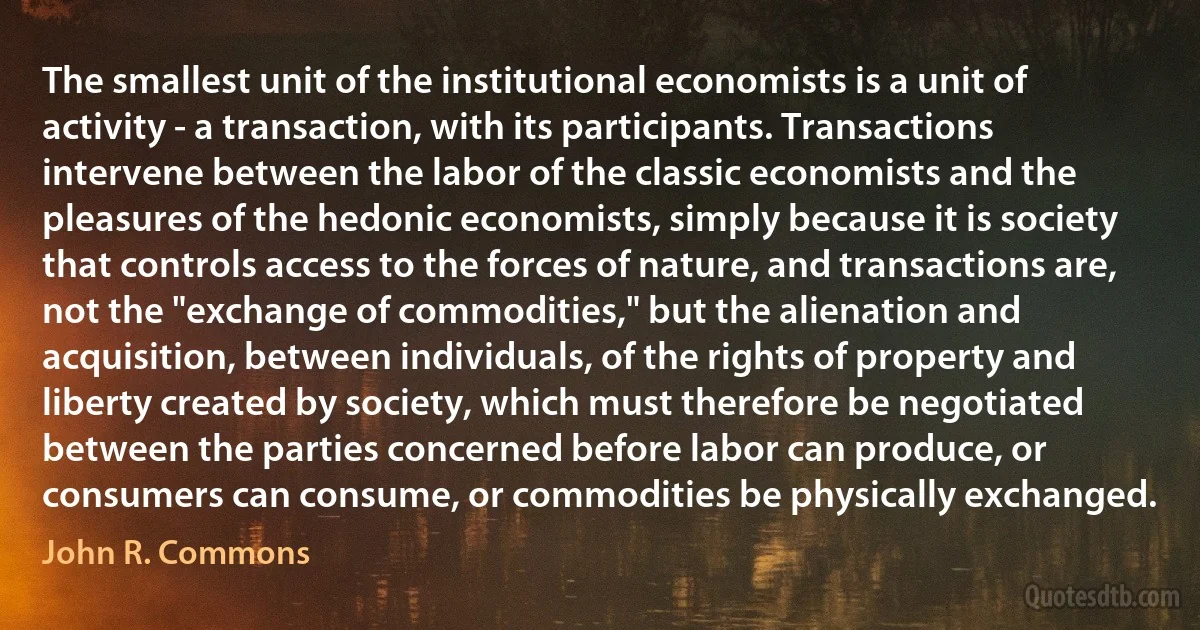
The smallest unit of the institutional economists is a unit of activity - a transaction, with its participants. Transactions intervene between the labor of the classic economists and the pleasures of the hedonic economists, simply because it is society that controls access to the forces of nature, and transactions are, not the "exchange of commodities," but the alienation and acquisition, between individuals, of the rights of property and liberty created by society, which must therefore be negotiated between the parties concerned before labor can produce, or consumers can consume, or commodities be physically exchanged.
John R. CommonsRelated topics
alienation intervene labor liberty nature produce property unitRelated quotes
The philosophy of science is concerned with how you decide if a scientific finding is correct or true. You have to establish criteria to determine if the finding or theory is valid. Validity is a fundamental problem in the philosophy of science, but the fundamental problem in the philosophy of scientific administration is the question of value. Two scientific activities are equally valid if they achieve results that are true. Now, how do you decide which activity is more valuable? The question of value is the basic question that the scientific administrator asks so that decisions can be made about funding priorities.

Alvin M. Weinberg
Under the rule of free competition, war between the producers of security entirely loses its justification. Why would they make war? To conquer consumers? But the consumers would not allow themselves to be conquered. They would be careful not to allow themselves to be protected by men who would unscrupulously attack the persons and property of their rivals. If some audacious conqueror tried to become dictator, they would immediately call to their aid all the free consumers menaced by this aggression, and they would treat him as he deserved. Just as war is the natural consequence of monopoly, peace is the natural consequence of liberty.

Gustave de Molinari
Reification, the essential tendency of capitalism, can never be wholly realized. If it were, if the system were actually able to change individuals into things moved only by economic "forces,” it would collapse not in the long run, but immediately. The struggle of people against reification is, just as much as the tendency towards reification, the condition for the functioning of capitalism. Capitalism can function only by continually drawing upon the genuinely human activity of those subject to it, while at the same time trying to level and dehumanize them as much as possible.

Cornelius Castoriadis
The majority's decision today will require States to issue marriage licenses to same-sex couples and to recognize same-sex marriages entered in other States largely based on a constitutional provision guaranteeing 'due process' before a person is deprived of his 'life, liberty, or property'. I have elsewhere explained the dangerous fiction of treating the Due Process Clause as a font of substantive rights. It distorts the constitutional text, which guarantees only whatever 'process' is 'due' before a person is deprived of life, liberty, and property. Worse, it invites judges to do exactly what the majority has done here.

Clarence Thomas
The innovation is hazardous, impossible for most producers. But if someone establishes a business having regard to this source of supply, and everything goes well, then he can produce a unit of product more cheaply, while at first the existing prices substantially continue to exist. He then makes a profit. Again he has contributed nothing but will and action, has done nothing but recombine existing factors. Again he is an entrepreneur, his profit entrepreneurial profit. And again the latter, and also the entrepreneurial function as such, perish in the vortex of the competition which streams after them. The case of the choice of new trade routes belongs here.

Joseph Schumpeter
